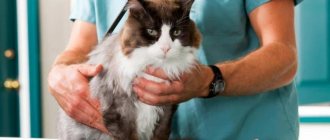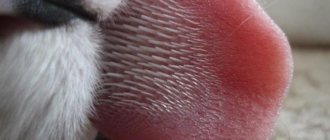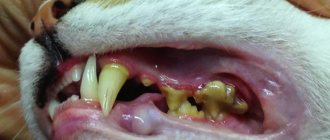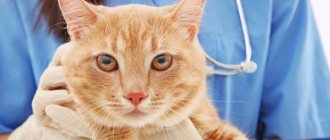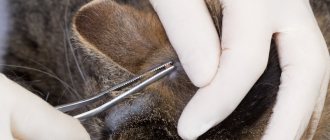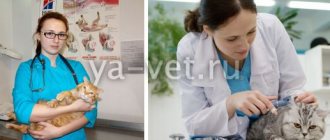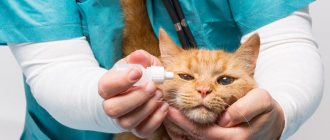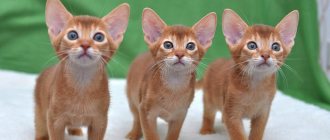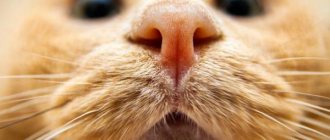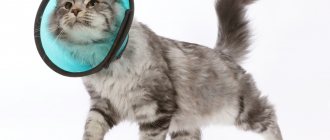The well-known “skill” of cats is purring. This is what you hear when you pet your pet and play with him. But sometimes cats “confuse” their owners with other sounds that can hardly be called “characteristic” of these animals. For example, rumbling in a cat’s stomach may look funny, but for many breeders, especially not very experienced ones, it can cause anxiety: is this phenomenon a harbinger of some serious digestive pathologies? Let's figure this out!
Why is he purring?
If you have ever experienced the feeling of “sucking” hunger at least once in your life, then you are probably familiar with the rumbling of your stomach firsthand. In such cases, this phenomenon indicates an empty digestive tract. This is how the body “hints” to its owner the need for a good meal. So it is in the case of a cat. If his stomach growls loudly, then your pet most likely simply wants to eat. As soon as you feed it, the animal will return to its favorite pastime - it will lick itself tastefully, and then sleep sweetly.
But! Sometimes a “hurricane” in your pet’s stomach indicates the exact opposite situation, that is, overeating. In the modern world, it is not uncommon for a cat owner to spend almost the entire day at work, returning only late in the evening. And it’s good if there are household members who can feed a hungry sufferer. Otherwise, the cat, having received its portion of food, greedily pounces on it, and then begins to beg for more. No wonder he overeats a lot. Grumbling and other strange stomach sounds in such situations are only a consequence of the inability of the digestive system to cope with the “happiness” that has fallen on it.
And the “roars” of the stomach are a trifle. If a cat has eaten so much that its gastrointestinal tract cannot digest it all properly, the food masses simply begin to rot and deteriorate. All this can lead to either severe food poisoning or serious indigestion. “Thunders and lightning” in the stomach of an overeating cat is a sure sign of impending diarrhea.
Aerophagia as a cause of grumbling
Another phenomenon is closely related to excessive gluttony. It's called aerophagia .
Translated, this literally means “eating air.” If a cat eats greedily, he simultaneously swallows a lot of air (sometimes so much that bloating develops). Part of it comes out through belching, and the rest goes deep into the intestines, where it produces rumbling and roaring sounds. Subsequently, the air comes out quite naturally, which is why aerophagia is often confused with flatulence. But, unlike gases in the intestines, it does not pose any particular danger. So what to do? Just try to feed your glutton more often, but in smaller portions. Then the cat will not swallow such volumes of air, and the problem will solve itself.
A cat's stomach is rumbling: reasons that cause a "hurricane" in a pet
The well-known “skill” of cats is purring. This is what you hear when you pet your pet and play with him. But sometimes cats “confuse” their owners with other sounds that can hardly be called “characteristic” of these animals. For example, rumbling in a cat’s stomach may look funny, but for many breeders, especially not very experienced ones, it can cause anxiety: is this phenomenon a harbinger of some serious digestive pathologies? Let's figure this out!
How are grumbling and worms related?
In the most direct way, no matter how strange it may seem. Perhaps you have seen mangy and disheveled kittens with oversized, swollen bellies? If so, then you are “lucky” to observe the main visual sign of toxocariasis: a swollen and pear-shaped abdomen with severe general exhaustion of the pet. You can easily verify this by stroking the animal in the chest area. You can easily feel the ribs protruding from under the skin. A sick kitten often has diarrhea, and the excreted feces have a greenish-yellowish color and an unbearably disgusting smell.
Why do cats have a problem?
Flatulence
Most often, a kitten's tummy is seething precisely due to bloating and increased gas formation in the intestines. This problem is common not only to people, but also to pets. In addition to the unpleasant aroma that comes from the animal, the owner may notice the cat's anxiety. If you touch her belly, she may begin to react inappropriately. This behavior is caused by pain.
In addition, sometimes gas formation is so severe that the pet has difficulty breathing, drooling, and other symptoms appear that indicate insufficient blood supply to the lungs. Flatulence in a kitten is often caused by gluttony. If a cat eats too much food, it simply does not have time to be digested. As a result, putrefactive processes are observed, which become the cause of rumbling, release of gases and toxins. If timely assistance is not provided, the cat may experience severe intoxication of the body, which can even lead to death.
The following factors can provoke flatulence in pets:
If a cat eats fermented milk products excessively, they can provoke such a symptom.
- eating stale food;
- allergic reactions to products;
- balls of hair in the intestines;
- helminthic infestation;
- abuse of fermented milk products.
Return to contents
Aerophagia
Gluttony also causes this phenomenon, which is an increased swallowing of air during food consumption. When a pet eats food too greedily, at the same time it swallows air. A small amount of it comes out during belching, while the rest penetrates the intestines, causing the kitten’s tummy to rumble. Then the air comes out naturally, which is why aerophagia is often confused with flatulence. However, unlike it, swallowing air does not pose a danger to the health and life of the cat. To cope with the problem, the first thing the owner needs to do is start feeding the cat more often, making the portions smaller.
Worm infestation
If your cat is vomiting and has a rumbling stomach, worms are often the cause. In addition to these symptoms, you can notice a serious increase in the size of the abdomen against the background of general thinness and exhaustion of the pet. Pets experience constant diarrhea, the feces take on a green tint and smell unpleasant. The body can contain hundreds of parasites that produce toxins during their life. If antihelminthic therapy is not carried out, the cat may die due to serious poisoning.
Intestinal helminthic infestation provokes the development of the following symptoms:
- yellowing of mucous membranes;
- increase in liver size;
- itching of the perianal area;
- hair loss;
- discharge of pus from the nose and eyes;
- blood impurities in stool.
Return to contents
Diseases
If a cat's stomach growls loudly, inflammatory processes in the pancreas may be to blame. As they progress, the owner may notice the cat vomiting, constant diarrhea, and loss of appetite. Often the cause of the problem is an ulcer of the stomach and duodenum. Rumbling is also characteristic of colitis, enteritis and gastritis. The characteristic sounds in the abdomen that develop against the background of these diseases arise due to disruption of the digestion of food and the movement of feces.
When the problem is due to nutrition
Rumbling in a cat's stomach can be caused not only by eating poor quality food, but also by intolerance to certain foods. For example, most pet owners are convinced that milk is an ideal treat for cats. However, this opinion is not true, since the body of almost all adult cats does not produce enzymes that allow them to digest fermented milk products. Drinking milk causes increased gas production and grumbling.
In addition, some cat owners do not hesitate to give them waste from their table. Veterinarians from the Zoovet clinic categorically do not recommend doing this. A pet's diet should include exclusively healthy food that contains sufficient amounts of vitamins and microelements. The cat menu includes lean types of meat. It is recommended to pay attention to turkey, chicken, rabbit and veal. Buckwheat and rice porridge, eggs and vegetables will help improve the digestive process.
It is permissible to give boiled sea fish no more than once a week.
Other factors
A cat’s stomach can growl not only from gluttony, but also from starvation. In addition, often the problem lies in the water, which, when it ends up in an empty intestine, makes characteristic sounds. They are most noticeable when the pet drinks cold liquid. It has an irritating effect on the mucous membranes of the intestines, as a result of which it begins to contract. The air moves actively and provokes a rumbling tummy.
The relationship between thirst and stomach grumbling
But not only by hunger! Sometimes the sounds made by your pet indicate his desire to drink, or that he has already managed to quench his thirst, having greatly succeeded in this . What does it mean? The fact is that with severe thirst, the intestines will make all the same sounds as if the cat was hungry. The lumen of the gastrointestinal tract in such cases is absolutely free, and therefore nothing interferes with the gases.
But when your pet gets well drunk, water will flow through its half-empty intestines, pushing forward all the same gas bubbles. The sounds of rumbling are interspersed with melodic murmurs. There is no need to worry: if your pet pretends to be a river stream, this phenomenon does not threaten its life and health.
Treatment
If the only manifestation of dyspepsia is loud rumbling along the animal’s intestines, then it should be:
- protect from stress;
- feed in small portions, but more often, in a specially designated place where no one will disturb the animal;
- you need to choose the right food, you can consult a specialist;
- if an animal eats artificial food, it is advisable not to spoil it with treats from your table, “human” food often provokes dyspepsia;
- trash cans should be kept out of the animal's reach.
If this strategy is not successful or additional alarming symptoms appear, you should definitely take your cat to the veterinarian.
Flatulence
We undeservedly forget one of the most important causes of stomach rumbling. This is “normal” flatulence. Almost every person is familiar with its manifestations, which create many problems in everyday life. In addition to the “roars” and the unpleasant odor emanating from the cat, flatulence is fraught with abdominal pain and even, in particularly serious cases, can lead to volvulus. Moreover, sometimes a cat's intestines become so full of gases that the cat breathes heavily, drools, and other symptoms indicate difficulty in the pulmonary blood supply.
Why does this pathology occur? The first reason is the already mentioned gluttony . When a cat eats too much, the food in his digestive tract simply does not have time to be digested. This leads to the development of putrefactive processes in the thickness of semi-digested food masses, accompanied by the release of large volumes of gas and toxins. Intoxication develops, the pet feels sick. But the cause of flatulence is still gases. Naturally, gases are only the least of all possible problems in such situations. The cat may either die or get severe food poisoning. If he's lucky, he'll get away with "just" severe diarrhea.
But what about pets who have never been noticed for gluttony, but are constantly developing flatulence? It is possible that it is not the cat who is overly fond of food that is to blame, but the food he eats. Firstly, it may simply be of poor quality . If this is the case, the food begins to rot in the cavity of the gastrointestinal tract and gases are released.
Stomach gurgles when poisoning is suspected
While petting a cat, you can often hear a grateful purr.
But from time to time the cat's stomach gurgles. This sound amuses some, but alarms others. A loving owner immediately asks himself the question: is this a symptom of a digestive disease? And what should you do if your cat’s stomach is rumbling? There can be many reasons for this rumbling in the stomach:
- The pet feels hungry.
- Binge eating.
- Aerophagia.
- Worms.
- Thirst.
- Flatulence.
Many animals are free-range (especially if the cat lives in a private home). Thus, it is very difficult for the owner to monitor the animal’s proper diet. Even if at home the cat eats the best food or exclusively natural, fresh products, no one can guarantee that the cat will not pick up something on the road or eat a mouse (and rodents are carriers of many diseases). Poisoning can cause both a rage in the stomach and more serious consequences, including death.
What to do in this situation? The first thing to start treatment with is gastric lavage. It is necessary to induce vomiting in the cat as soon as possible, for which you can pour a weak solution of potassium permanganate or hydrogen peroxide into the mouth (0.5 teaspoon of peroxide per 3 kg of weight, diluted in a glass of water). If there is no vomiting, and the cat gets worse, it is necessary to perform gastric lavage at the veterinary clinic.
In any case, seething in a cat’s stomach is an abnormal situation and requires attention from the owner of the animal. If there are no other symptoms besides seething, there is no point in worrying. You just have to limit the animal’s food intake and keep the cat on a gentle diet. If other symptoms listed above are observed, the help of a qualified veterinarian is necessary.
About diagnostics
The basis for making a diagnosis is questioning and examination. A more accurate diagnosis can be made only after receiving test results. Stool, urine and blood are collected from the patient. Based on these data, you can almost always determine the cause of the malaise.
If a gastric ulcer is suspected, the patient is prescribed an FGDS procedure. During fibrogastroduodenoscopy, specialists use a probe. It is used to visually examine the surface of the mucous membranes of the digestive organs.
If intestinal pathology is suspected, colonoscopy and sigmoidoscopy are sometimes prescribed.
What to do?
If gurgling in the abdomen is not provoked by pathologies, specific therapy for this condition is not required. It is enough for owners to protect the cat from stress. Then you need to change the diet, excluding from it the food that he prepares for himself. It is recommended to feed your cat natural food, but you can diversify the menu with industrial supplements. It is better to entrust the choice in favor of one of them to your veterinarian. Feeding the cat should be done indoors, where no one will disturb her. It is recommended to make smaller portions, but feed the animal more often. In order not to provoke food poisoning from spoiled food, the trash can must be installed in a place inaccessible to the cat.
Opisthorchiasis in children
Our readers successfully use Monastic Tea to treat gastritis and ulcers. Seeing how popular this product is, we decided to bring it to your attention. Read more here...
Children are more likely to experience various types of helminthic infestations. One of the diseases is opisthorchiasis ( a disease from the group of trematodes caused by parasitic flatworms from the genus Opisthorchis - Opisthorchis felineus and Opisthorchis viverrini
), affecting the liver, pancreas, bile ducts.
The parasite that causes opisthorchiasis ( a disease from the group of trematodes caused by parasitic flatworms from the genus Opisthorchis - Opisthorchis felineus and Opisthorchis viverrini
) is the cat or Siberian fluke. It belongs to the liver flukes and has a leaf-shaped life form 5-15 mm long. The parasite is characterized by a complex life cycle and changes several hosts during its life. The first link is the snail, then the fish, the last is the people themselves, animals (domestic dogs, cats). In the body of the final host, fluke larvae pass into the stage of adult parasites and begin to multiply rapidly.
The disease has a territorial border: the regions of the Far North and Siberia. Among the children's age group living in the region of Western Siberia, more than 80% suffer from opisthorchiasis ( a disease from the group of trematodes caused by parasitic flatworms from the genus Opisthorchis - Opisthorchis felineus and Opisthorchis viverrini
). Associated with the consumption of fish products by the majority of the population without proper processing. The Siberian fluke lives in river and lake water, and is more often found in crucian carp, bream, ide, and roach.
The symptoms and treatment of the disease are unique. Opisthorchiasis in children sometimes develops asymptomatically. Causes serious complications in the future - it is important to diagnose the disease in time. The disease is chronic and severe exacerbations occur. A feature of the development of the disease in children is its similarity to a harmless cold (fever, malaise) or food poisoning. The result is the prescription of the wrong medications.
We recommend reading: How to Treat Cestitis in Dogs
Methods of entry of fluke larvae:
- The presence of poorly processed fish on the menu (dried, lightly salted).
- Eating undercooked fish pieces.
- Purchasing fish products from dubious markets.
- Violation of sanitary and hygienic standards.
Infection of infants occurs if the mother did not wash her hands properly after preparing raw fish - parasite larvae got into the baby’s mouth. Infection of a child in the womb is impossible.
Ways to recognize a disease (this is a condition of the body, expressed in disruption of its normal functioning, life expectancy, and its ability to maintain its homeostasis)
Signs of the presence of a cat fluke in a child’s body ( in the main sense, a person during childhood
) have similar features to other non-helminthic infections. There are no clearly defined manifestations characteristic of the presence of the described parasites. Symptoms depend on the stage of infection and the age of the child.
There are two forms of the disease:
The acute stage of the disease develops within two weeks and lasts up to two to three months. Manifestations are distinguished:
- increased body temperature;
- allergies in the form of a red rash that worries the child;
- lethargy and weakness;
- insomnia;
- muscle and joint pain;
- hysterics, tearful mood;
- decreased appetite, complete lack of interest in food;
- nausea, rumbling, dull pain in the abdomen;
- bowel dysfunction (diarrhea or constipation).
In children from infancy to three years of age, a slight runny nose and cough are observed, and a large number of eosinophils are present in the blood. In infants susceptible to allergies, severe dermatitis and diathesis are possible.
Older children complain of feeling unwell and get tired quickly. In adolescence, against the background of illness, there is a possibility of developing heart pathology, febrile conditions, bronchial and pulmonary inflammation appear.
Chronic form of the disease ( this is a condition of the body expressed in disruption of its normal functioning, life expectancy, and its ability to maintain its homeostasis
) lasts from a year to several years. Character traits:
- Cholepathy.
- Gastroenteropathy.
- Bowel problems (diarrhea or constipation).
- Decreased appetite.
- Constant severe pain in the right side of the abdomen.
Preschool children may be physically delayed in development. Opisthorchiasis is often confused with diseases of the digestive tract.
Definition of disease
Manifestations of the disease in a child are similar to other diseases. If there is any suspicion of helminthic infestation, you should urgently undergo examination. The chronic form of the disease sometimes leads to serious illnesses - pancreatitis, hepatitis, liver failure, Quincke's edema. All this threatens the child's life.
To accurately determine the cat fluke in the baby’s body, you should take blood and urine tests, do a fecal coprogram and an ultrasound examination of the abdominal organs. Additionally, they are referred for x-rays and endoscopy. A reliable way to determine the presence of parasites is to examine stool, but parasites can be detected three weeks after entering the body.
At the doctor’s appointment, it is necessary to tell what products the child takes, what the parents and close relatives do. The risk of getting sick increases in children whose loved ones work in the fishing industry.
Correct diagnosis of the disease will help doctors prescribe appropriate medications and prevent complications.
Treatment of opisthorchiasis
Treatment of helminthic infestation depends on the stage of the disease, the age of the child ( in general, a person during childhood
), general health. It is important to follow the pediatrician’s prescriptions and get tested in a timely manner. A severe stage of the disease must be treated in a hospital hospital.
Infants are less likely to suffer from opisthorchiasis; infection from the mother through milk is impossible. The younger the child, the more dangerous the consequences. The treatment regimen is the same as for older children, but with careful selection of medications.
Stages of treatment
Doctors divide the course of treatment for children into three stages:
- Preparation - antihistamines, anti-inflammatory drugs, enterosorbents that improve the functioning of the digestive system.
- The fight against helminthic infestation - choleretic medications, antiparasitic therapy.
- Rehabilitation after treatment - vitamin complexes, choleretic agents, drugs to restore the gastrointestinal tract.
The main medicine against helminthic infestation is Praziquantel. It is allowed to be given to children over two years of age, but be sure to follow the exact dosage calculated based on the child’s body weight. Excessive amounts of medication negatively affect children's health.
In the treatment of a disease ( this is a condition of the body, expressed in disruption of its normal functioning, life expectancy, and its ability to maintain its homeostasis
) it is worth reconsidering your diet. For school-age children, diet No. 5 is suitable (low-fat dairy products, stewed and boiled vegetables, lean fish, dietary meat). Smoked, fried, fatty, salty, and spicy dishes are excluded from the menu.
After recovery, the child is registered at a dispensary, which lasts up to 3 years. Stool tests are required three and six months after taking the medication. If fluke eggs are detected again, the doctor again prescribes antihelminthic medications.
Subject to compliance with the diet, comprehensive treatment of the disease, and the correct course of rehabilitation, the child ( in the main sense, a person during childhood)
) is completely cured without serious consequences.
How to get rid of gases in the intestines
If a “hurricane in the stomach” hits you at the wrong time, you can find help for it. Experts tell you how to do this. Last December, an American Airlines plane made an emergency landing before reaching its destination. The reason was people's complaints about the strong smell of burning matches in the cabin. The box was found on the seat of one of the passengers. The FBI was called to the scene. During the investigation, it turned out that by lighting matches, the woman was trying to mask the smell of her own intestinal gases. Due to the apparent lack of malicious intent, the unfortunate lady was quickly released and sent on another flight. Subsequently, commenting on the situation, the Associated Press agency stated that the attack of flatulence was due to the woman’s health condition. Flammable zilch Doctors are skeptical about stories about fires caused by a burning match brought to the place where the “winds” are emitted, but they do not deny the fact: intestinal gases are really flammable. “When eating predominantly fatty meat products and certain diseases, methane accumulates in the intestines,” says Professor Alexey Severtsev. — In the literature there are descriptions of internal explosions during the exhumation of corpses and the removal of polyps with an electric scalpel. True, such cases are very rare. However, before medical procedures, the patient’s intestines are cleared of gases (with a special diet, enemas, laxatives) in order to avoid “pyrotechnic effects.” In addition to methane, the food factory inside us produces many other volatile and odorous compounds. The most foul of them - hydrogen sulfide, reminiscent of the smell of rotten eggs - indicates that animal proteins are being digested in the intestines. A sour smell is indicated by an excess of hard-to-digest fiber in food - cabbage, legumes, radishes, radishes, black bread, nuts and others. And also beer and kvass. Most intestinal “exhausts” are odorless. But the “musical accompaniment” occurs from the vibration of the walls of the anus, when a lot of gases are released simultaneously and at high speed. It is believed that an adult produces from 0.5 to 1.5-2 liters of gas per day. Some of them are absorbed back by the intestines. Did you overeat and “gas”? Troubles in the form of increased gas formation and rumbling in the stomach most often arise due to poor nutrition. Everyone knows about the gas-hazardous properties of peas and cabbage. But these are not the only provocateurs. “A passion for Japanese cuisine and exotic products that we are not genetically accustomed to is not healthy,” explains Igor Khalif, deputy director of the State Scientific Center for Coloproctology. — The pancreas does not have enough enzymes to digest unusual foods. Undigested residues begin to rot and ferment in the intestines, which is accompanied by the release of gases. But since microorganisms living in the intestines actively participate in food processing, it also depends on them whether everything will go without unnecessary noise and smell. “When there are fewer beneficial bacteria and more pathogenic bacteria (dysbacteriosis), this is signaled by increased gas formation and bloating,” continues Professor Khalif. “But these same phenomena can be harbingers of serious diseases - irritable bowel syndrome, gastritis, colitis and even cancer. If excessive gas production and a feeling of fullness in the stomach do not go away for several days, if pain appears, you should consult a gastroenterologist or coloproctologist. Stay alive - Discomfort from overeating is reduced by sorbents that absorb excess gases, such as activated carbon or smecta, says Igor Khalif. — There is another group of drugs based on simethicone, which breaks up air bubbles into smaller ones, and they are easier to remove and do not cause overstretching of the intestinal walls. In case of dysbacteriosis, bifido-, lacto- and other beneficial bacteria help restore normal intestinal microflora. But don’t expect supernatural effects from consuming kefirs and yoghurts enriched with microorganisms that are advertised today. In order for beneficial bacteria to reach their destination - which is the small and large intestines - they need to travel a long way, where they are affected by hydrochloric acid, enzymes and bile. Few “survive”. For example, 20-30 doses of bifidobacteria per day provide a therapeutic effect, and, say, in one 150-gram jar of fermented milk products there are about 5 of them. If the cause of increased gas formation is a disease, and not overeating, pancreatitis, gastritis, inflammation in the colon or small intestine. Then the delicate problem will be solved. "AiF" recommends: To reduce gas formation in the intestines: - Eat slowly and do not chat during meals, so as not to swallow air with food. - Limit carbonated drinks. - Take a walk after eating. — If you like legumes, first soak them in water and then boil them thoroughly - this way they lose some of their gas-forming properties. Source:
